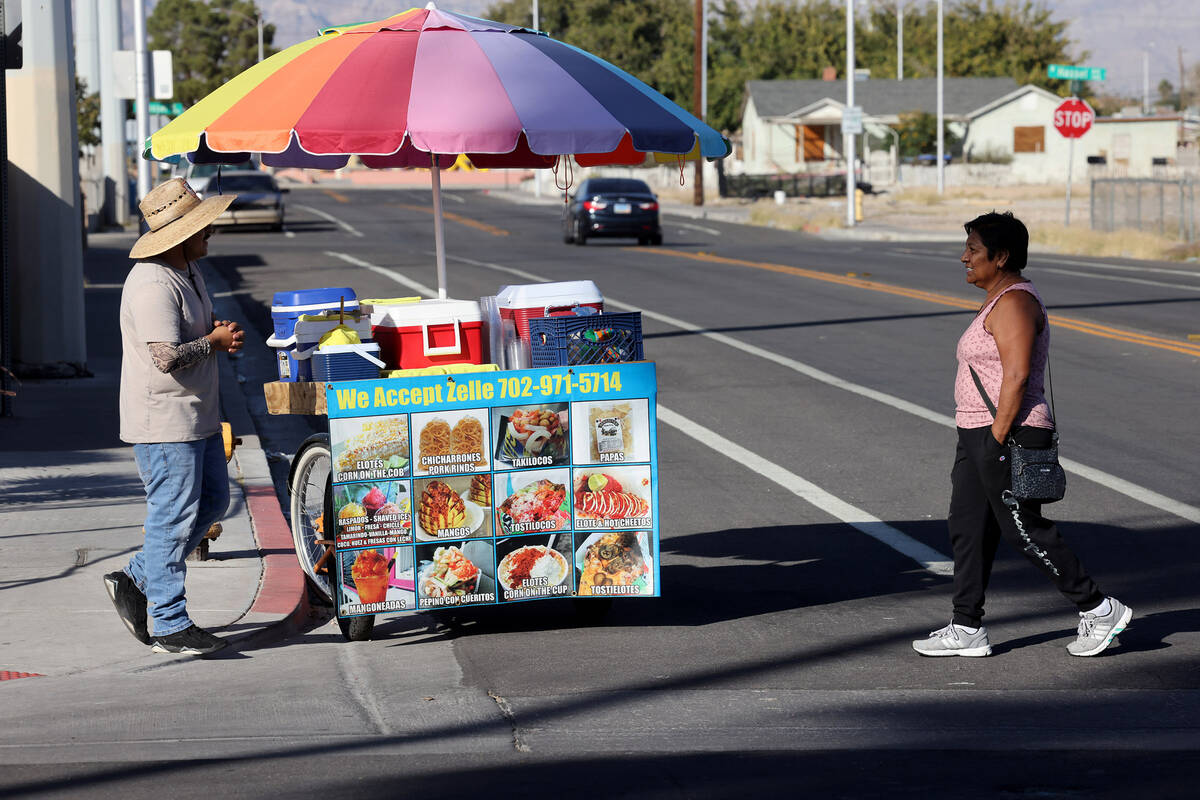Tough regulations taking shape for county street vendors
Unlicensed sidewalk vendors could have prepared food destroyed by law enforcement and county officials under a proposed ordinance.
The proposed ordinance, which has not yet been formally introduced by county commissioners, lays out requirements and rules for street vendors to operate in Clark County.
The proposal, which was posted to the Department of Business License’s website on Feb. 22, is the county’s next step in creating a licensure process for street vendors and bringing the county in line with state law.
Licensing requirements
Among the proposed requirements, the ordinance would require vendors to file an application that includes information about the vendor, a description of the products the vendor intends to sell and proof of general liability insurance.
Vendors will be required to maintain an insurance policy for $250,000 for bodily injury and $50,000 for injury or destruction to property.
Vendors are also required to pay an annual license fee of $150, obtain a permit from the Southern Nevada Health District and hold a food handler card.
The initial health district permit costs $863, with a $376 fee to renew the following year, said Nikki Burns-Savage, a supervisor of specialized foods operations at the Southern Nevada Health District.
Sidewalk vendors are currently subject to the same health requirements as open air vendors, Burns-Savage said during a panel at the Vegas Chamber Friday. The only difference is that sidewalk vendors will have the option of paying through a payment plan, which was a requirement in the state bill.
Burns-Savage said the health and food safety requirements are a matter of public health.
“Our regulations are not arbitrary. They are not written just to be difficult or for us to be mean,” she said. “We want to be consistent across the board. Our main goal, the reason why we exist is to prevent food-borne illness. We don’t want anyone to be sick.”
Clark County Commissioner Marilyn Kirkpatrick, who was also on the panel, echoed that point.
“I’m comfortable with being strict to ensure that public health is our No. 1 priority,” said Kirkpatrick, who serves as the chair of the SNHD board.
John Iannucci, the vice chairman of the Nevada Restaurant Association, said those in the restaurant business want everyone to be held to the same standards when it comes to food safety.
“We just want the same standard. It’s got to be the same gold standard across the industry,” John lannucci, Vice Chairman of the Nevada Restaurant Association & COO for BurgerFi, said during the panel discussion.
Restrictions
The ordinance also lays out several restrictions for sidewalk vendors’ operations, including the size of their business, times when they can’t operate and certain locations where they are prohibited from operating.
The proposed ordinance limits a sidewalk vendor’s operation, including equipment, food and signs, to be contained within 25 square feet, and limits each vendor to one stand or cart.
The proposal also prohibits sidewalk vendors from operating between 9 p.m. and 8 a.m. unless a vendor is operating at a permitted construction site or a commercial place of business with the site owner’s permission.
Burns-Savage said the health district requires open air vendors – which sidewalk vendors are currently considered under its regulations – to provide a letter from the property owner stating that they have permission to operate on a property they wish to sell from.
The proposed ordinance prohibits vendors from selling non-food items, including alcoholic beverages, tobacco products, cannabis products and weapons, among other items. It also prohibits vendors from using sound-making devices like speakers or dispose of waste on private property, among other restrictions.
The first ordinance passed by county commissioners late last year banned street vendors from working within 1,500 feet of a resort hotel or near a facility that can seat at least 20,000 people, among other areas.
The newest ordinance also bans vendors from operating within 500 feet of multiple locations, including certain permitted special events, schools while they are in session, and any county party, recreational facility or community center.
Vendors are also banned from operating within 150 feet of another sidewalk vendor, a licensed food establishment during its operating hours, establishments are licensed to have 16 or more slot machines, and the vehicle entrance to any fire station, police department or hospital.
Further, vendors are prohibited from operating within 15 feet of street intersections, public restrooms, bus stops, crosswalks, a building entrance, exit or emergency exit, among others.
Enforcement
Business license enforcement officials and police would be charged with enforcing the ordinance.
An individual who violates the ordinance could face a civil penalty of up to $500 for each violation. An individual who violates the law outside of a residential zone could be found guilty of misdemeanor, which could result in six months in jail or a $500 fine, or both.
Law enforcement and business license employees may also immediately destroy food cooked or prepared by a sidewalk vendor that does not possess a valid permit issued by the health district.
Coming into line with state law
Last year, lawmakers passed legislation that created a framework for the legalization of street food vending. The bill requires local jurisdictions to establish a licensing process for vendors.
Clark County commissioners unanimously approved an ordinance in October to ban street vendors from working within 1,500 feet of a resort hotel or near a facility that can seat at least 20,000 people, among other areas.
The newest proposed ordinance would bring Clark County fully in line with the law and must be in effect by July 1.
The bill caused confusion when it took effect this summer, which led to calls to better inform the community about how the licensing process would be rolled out.
The proposed ordinance was posted to the department’s website seeking comments from business owners and interested parties about whether the proposal will impose a significant economic burden on a business or directly restrict a business’ formation, operation or expansion.
The ordinance is set to be formally introduced during the county commission’s meeting on April 2.
A spokesperson for Make the Road Nevada, a nonprofit organization that advocates for working class immigrants and street vendors, did not respond immediately to a request for comment Friday afternoon.
Contact Taylor R. Avery at TAvery@reviewjournal.com. Follow @travery98 on X.




























